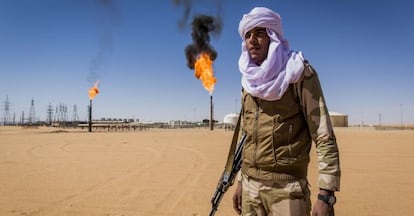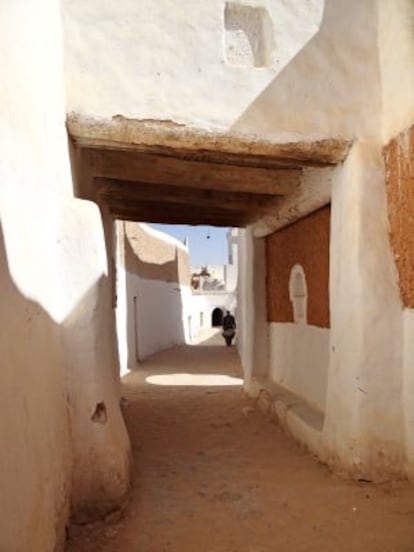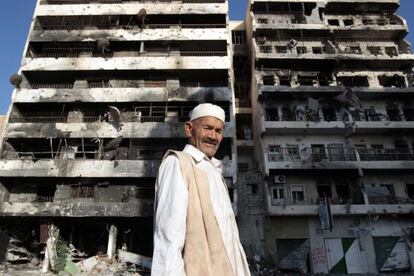Libya: the chaos continues
Two years after the dictator's demise, EL PAÍS finds that it is still hard to know who runs the country There is no army or police, and the jihadist threat is ever present

Libya is not a state, it is not a president, and it is not a government. Libya is a bunch of militias who do what they want: not even the prime minister can protect himself," said Sami Zaptia, the joint editor of the Libya Herald, last Thursday after the kidnapping of Ali Zeidan, the country's prime minister, by a group of armed men. A few hours later, another group rescued him. The reason for the kidnapping was unclear: it could have been to force him to resign, or he could have been held as part of a planned exchange for Al Qaeda terrorist Abu Anas al-Libi, captured last week in Tripoli during a US-directed mission.
Zeidan's kidnapping is just another event in the long list of attacks, bombings, and reprisals that have become commonplace in Libya since the overthrow of Muammar Gaddafi in 2011. Welcome to the new Libya.
Tripoli is buzzing. The capital has recovered from the war, which was fought between February and October 2011 and brought an end to 42 years of the Gaddafi dictatorship. Its markets are awash with merchandise, and the smart streets of the center of the city are lined with shops selling luxury goods: BMW has just opened a new showroom there.

Tripoli seems to be in the grip of one huge traffic jam. Where is everybody going at 11 in the morning? One of the many mysteries of the new Libya. "Nobody works here," says Ahmed, a pharmacist. Unemployment is around 33 percent, and all the work is done by immigrants: Tunisians and Moroccans in the hotel and services sectors; Egyptians in agriculture and fishing; Africans and Bangladeshis in construction. Half of all adult Libyans are employed by the state. The rest run family businesses. But there is no shortage of money. Nobody trusts the banks, and everybody pays in cash.
This is also the new Libya. Schoolgirls leave their classes at midday in their blue or black uniforms, their heads covered by white scarves, while in the evenings, gays meet under the freeway bridges, close to Martyrs' Square. The cafes are full, and radio stations now blast out rap music, while new publications are available in the newsstands.
"There is an insatiable appetite for knowledge, to learn languages, something that Gaddafi banned," says Sami Zaptia. The Libya Herald is an English-language news website he and around 10 other journalists set up in the aftermath of Gaddafi's downfall, and which now has around a million online readers. "Libya is not Iraq, it is not Afghanistan, and it is not Syria. There are many challenges and problems, because this has been a traumatic process. Democracy is a culture, and the majority of Libyans know nothing but Gaddafi. Dictatorship is horrible, but it provides order and stability. We are confused at the moment, and we have every right to be so," Zaptia says.
Libya is not a state. Libya is a bunch of militias who do what they want"
In physical terms, little remains of the dictator and his regime other than graffiti caricatures sprayed throughout the city, along with the ruins of the vast Bab al-Aziziya, Gaddafi's military compound that was bombed by NATO forces. The destruction wrought during the war will, however, take a long time to rebuild.
Much of the confusion and chaos described by Zaptia has been caused by the authorities. The General National Congress, elected in July 2012, still hasn't been able to put together the commission that will be tasked with writing a new constitution. Wrangling between the Muslim Brotherhood and the liberals is constant. "Well, yesterday they agreed to ban pornography on the internet, which as everybody knows, is Libya's number one problem," says Ali, an English teacher, ironically. "We are in a dangerous limbo. In politics, if you don't progress, you go backwards," he adds. The entrance to Congress is filled with hundreds of people looking for somebody to help sort out their problems. Among them is Muna, who desperately turns to anybody entering who looks as though they might hold some official position: her son has been kidnapped.
"We had a revolution because we wanted a modern country. But the people in charge now are the same as Gaddafi. They are a bunch of thieves," says a man standing nearby. "The Libyan government's budget is bigger than that of Egypt's. That is a country of 85 million; there are only six million of us. What is going on?"

The provisional government led by Ali Zeidan - who is a well-intentioned liberal but has little room to maneuver - is clearly overwhelmed by the size of the challenges it faces. Everything needs to be done, and everything means everything. Gaddafi left behind a country without institutions and mired in corruption. The health and education systems are falling apart, there is a chronic housing shortage, and very little infrastructure. But the biggest problem is security, which depends on hundreds of militias set up by civilians to fight Gaddafi's troops, and who have held on to their arms. The government wants to incorporate them into the new army, and has created two intermediary units to do so: the so-called Libya Shield, which groups together the militias that will be incorporated into the army; and the Supreme Security Committee, whose members will end up in the police. But many of these qatibas, or brigades, are answerable to nobody. They do not trust the authorities and the authorities do not trust them. Power emanates from the Kalashnikov.
Among the myriad qatibas is a group of men based in the city of Zintan that is holding Gaddafi's son, Seif al-Islam, and who refuse to hand him over to the government. The qatibas also control the prisons, where torture is widely practiced, according to human rights groups. "The police can't do anything. They are useless. It's us who fight crime, car theft, drug trafficking, illegal sale of alcohol, and we are still arresting supporters of Gaddafi," says Murad Hamza, who, at the age of 30, is in command of one of the most powerful qatibas in Tripoli, the Souq al-Juma. Almost half of his 500 men have since returned to civilian life. The rest are waiting to be incorporated into the intelligence unit of the new police force. "We get on well with the qatibas. The Islamists fought hardest against Gaddafi, but we will never allow them to take over. If they want to go to Syria to fight, then may God go with them," says Hamza, a former economics student until he took up the gun. He opens an enormous safe to show off some of the illegal goods he and his men have confiscated. He looks inside it, and then shouts: "Who the hell has stolen the bottle of whisky?"
Around 600 kilometers southwest of the din and chaos of Tripoli, Ghadames lies amid the silence of the desert. This Berber oasis, close to the borders of Tunisia and Algeria, was a center of one of the main caravan routes that crossed the Sahara in Roman times.
There are no tourists exploring its wonderful historic center, a labyrinth of alleys and narrow streets with UNESCO World Heritage status. The dust covers the shelves in the few leatherwork shops still open. Several restaurants and two of the three hotels have closed. The revolution has hit a city once protected by Gaddafi hard. The dictator built a new town on the outskirts to house 10,000 people, moving them from what had been insalubrious conditions. During the war, the oasis was besieged by rebel forces, and only fell once Tripoli had been taken. But nobody wants to talk about politics. "Gaddafi helped us, but we didn't like his ideology," says Tahir, a teacher and tourist guide who hasn't worked for at least two years.
In fact, the only people working are Africans, who are helping to rebuild and repair the historic quarter, and who live apart from the rest of the population. They are from Mali, Chad or Niger, and for them, Ghadames is one step closer to Europe. They travel through the desert on foot, and cross frontiers controlled by traffickers of arms, people and drugs. It was from Libya that the Al Qaeda group that attacked the Algerian gas plant in Amenas in January set forth.
Leaning against the wall of the old cemetery, Mohammed dreams of a prosperous future for his hometown, which he only comes back to during the vacations. He left to study aeronautical engineering in Canada and like most students, did not want to return home to Gaddafi's madhouse. "Ghadames has magnificent conditions for aerial navigation. We could turn this into Africa's communications hub," he says, suggesting a poetic update for the former Saharan stopover town.

"Welcome to the revolution" reads a huge sign at the airport of Benghazi, the capital of the region of Cyrenaica, reminding visitors of the key role played by the country's second city in the fight to overthrow Gaddafi. But the reality, once the visitor talks to local people, falls way short of euphoria. "Everything is bad," says businessman Fahmi Igwian as he drives around the rundown streets lined with uncollected rubbish.
The day we are visiting, in early October, an air force officer has been killed in an ambush as he took his child to school. The boy, age eight, was also killed. The two deaths add to the more than 60 assassinations of military personnel in recent weeks. "Many of them had nothing to do with what went on before the revolution. At eight every evening, I lock my doors. I don't go out unless it's an emergency, and try to use the phone if I need something. I am afraid," Fahmi admits.
Who is killing military personnel? Another of the many unanswered questions in Libya. Who placed the bomb in the main court building in Benghazi in September? And who destroyed, the same month, the Foreign Ministry's offices here? Who killed US Ambassador Chris Stevens in September 2012? The government says it doesn't know. But in private, and always under condition of anonymity, those in the know - particularly members of the militias - blame jihadist cells operating from the Green Mountains to the east of Benghazi, where Algerians and Tunisians have now joined local extremists. "The most important thing we have to do is to protect ourselves from them. The state is doing nothing. And this increases the feeling that Benghazi has been abandoned," says one local.
There is no shortage of money. Nobody trusts the banks and everybody pays cash
Yalal al-Arasi, who fought in a militia and now supports the federalist movement that has emerged in the east of the country, says that there is another reason for the government's inaction: "They are doing nothing because they want this region to remain unstable." The old rivalry between Tripoli and Benghazi, which Gaddafi played up, has continued after the revolution. "We don't want independence, but simply a federal system, like in Germany or the United States. Our region has only 60 seats in the new Congress, compared to Tripolitania's 100. Tripoli has everything: ministries, embassies and businesses. And the government there shares things out as it sees fit. But our region, Cyrenaica, produces 75 percent of the country's crude oil exports."
In recent months, the federalists have prevented oil from reaching the refineries and ports. Crude oil production, which in 2012 showed signs of returning to pre-revolution levels of 1.6 million barrels a day, fell by 90 percent. The government says it has since increased output by 700,000 barrels a day. The economic damage to a state that still doesn't collect taxes and that relies on oil for half of GDP and almost 100 percent of exports is huge.
Democracy is a culture, and the majority here know nothing but Gaddafi"
Aside from oil, Libya produces nothing. It imports 80 percent of its foodstuffs and 60 percent of its gasoline, which is sold at subsidized prices and costs less than water: nine euro cents a liter. This explains why Libyans rarely get out of their cars. The IMF has recommended that Libya begin diversifying its economy: that it develops its refining capacity, its petrochemicals sector and its industrial fabric. But bureaucracy, the absence of an efficient banking system, and laws that will establish Sharia banking (which forbids charging interest), or others limiting foreign participation, are a cause for concern.
"I predict a second revolution. People are angry: young people, the poor... We are all sick of this system, which is out of control," says Zuair al-Barassi, a journalist and radio presenter, who is fearful of the growth of the Islamists. "Yesterday they attacked the university in Darna. In the east and south they have power bases. But we don't want them here." In September, after the assassination of the US ambassador, the people of Benghazi threw the Ansar al-Sharia brigade out of the city and burned down its headquarters. But the Islamists are returning, taking advantage of the power vacuum.
"For the moment, the only protection we have are the Defense Ministry's special forces," says Zuair, smoking one more cigarette while detailing another death threat he has received. "I am sorry to say this, but I am sick of this city. I want to leave. I want my daughter to have a normal life."
The Grad missiles that Gaddafi's forces used to hammer Misrata with for four months have left their mark on the city, but now, their deafening explosions have been replaced by the sound of fireworks being let off to celebrate the estimated 400 weddings that take place here each month. Tripoli and Benghazi may be unhappy with the outcome of the revolution, but here in Misrata, everybody seems happy. "At last we are living in peace," says Yumaa, a market trader in this hard-working, prosperous city. Dubbed the "martyr city," it bravely resisted a brutal siege in the war, losing around 1,000 people in the process, and suffering terrible damage. Today it is effectively a city state, dynamic and proud.
The Islamists fought hard against Gaddafi, but we will not let them take over"
The scars are still visible. The phantasmagorical insurance tower, formerly a nest of snipers, looms over Midan al-Nasr. This was once the leafy neighborhood built by the Italian colonizers, and destroyed by Gaddafi. In its place, he built a horrendous square dominated by a clock that nobody ever bothered to set properly.
Many buildings in Tripoli street are still burnt out, although their ground floors have been turned into makeshift shops selling sports goods, clothes or furniture. Libyans are born traders, and the people of Misrata are no exception. The airport, destroyed in the war, now has international flights to Turkey, Jordan, Morocco and Tunisia. The port is Libya's most active, perhaps because it pays no heed to the legislation laid down by Gaddafi, and still applied in the rest of the country, that it can only function eight hours a day.
Misrata is the perfect laboratory to study the phenomenon known as south-south trade. Yumaa imports shoes from China, and textiles from Turkey, which he then sells to traders in the rest of Africa. Misrata is also the safest place in Libya, with more than 230 militias taking turns to guard the city. Along the road out to Tripoli, an arch, exactly where the front line used to be, marks the entrance to what looks like an independent republic, and which has its own customs checkpoint. Anybody coming in, whether by air, sea, or land, has to show their passport. "It has hit trade hard, with sales falling by around 60 percent. Many of my customers, from Sudan and other places in Africa no longer come here, due to the excessive controls. They go to Dubai now," says Yumaa, adding: "But I think it is a good thing: security and safety are the priority."
Mohammed Salabi, a resident who was shot in the back during the conflict and who now walks with the aid of a stick, says that the people of Misrata have always been good organizers. "In Benghazi all they do is complain; they talk a lot, but they do nothing. The problem is that Gaddafi was the only thing that brought us all together. Now that he is gone, we are looking for something else to fight against. Young people have very different aspirations to us older people. Then there are the differences between the religious and the non-religious. There are Libyans in exile, who are westernized and well-educated and trained, and then there are those who stayed behind... We will have to find our own identity. And that will take time."
Tu suscripción se está usando en otro dispositivo
¿Quieres añadir otro usuario a tu suscripción?
Si continúas leyendo en este dispositivo, no se podrá leer en el otro.
FlechaTu suscripción se está usando en otro dispositivo y solo puedes acceder a EL PAÍS desde un dispositivo a la vez.
Si quieres compartir tu cuenta, cambia tu suscripción a la modalidad Premium, así podrás añadir otro usuario. Cada uno accederá con su propia cuenta de email, lo que os permitirá personalizar vuestra experiencia en EL PAÍS.
¿Tienes una suscripción de empresa? Accede aquí para contratar más cuentas.
En el caso de no saber quién está usando tu cuenta, te recomendamos cambiar tu contraseña aquí.
Si decides continuar compartiendo tu cuenta, este mensaje se mostrará en tu dispositivo y en el de la otra persona que está usando tu cuenta de forma indefinida, afectando a tu experiencia de lectura. Puedes consultar aquí los términos y condiciones de la suscripción digital.








































